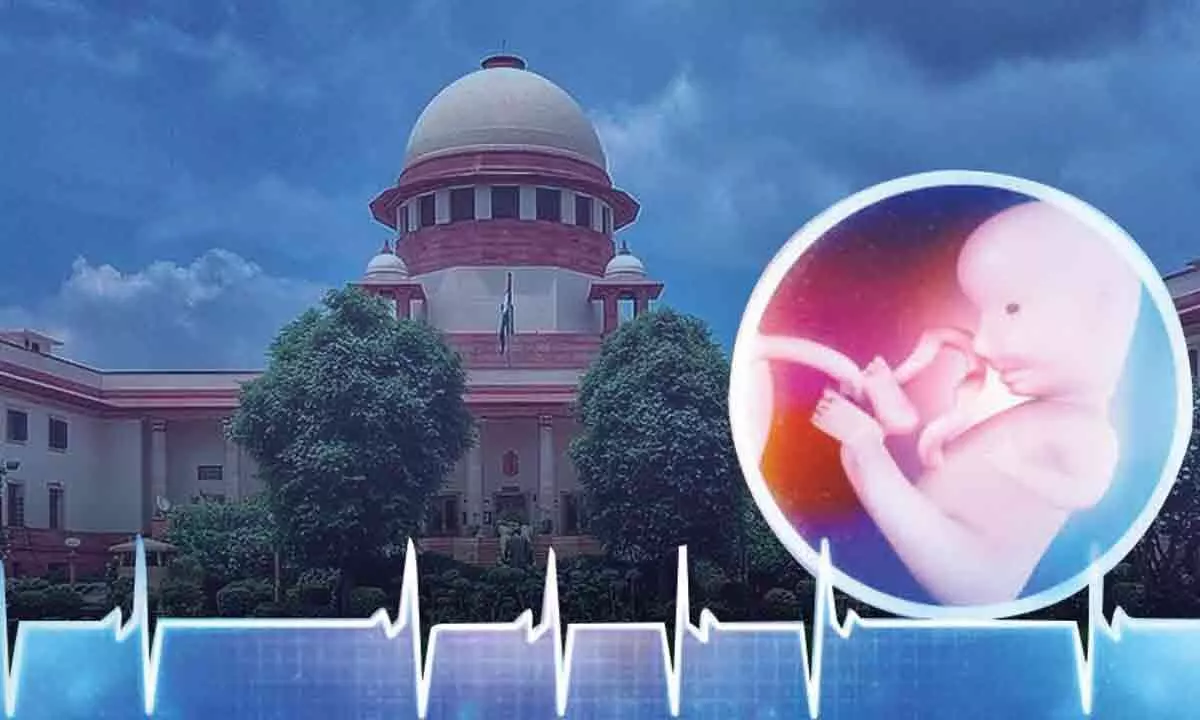Live
- India among top 10 countries with AI readiness: Report
- UNICEF to support Kerala's children with special needs
- Meta purges over 2 million accounts linked to scam centres
- Mumbai, Delhi ranked among top 5 prime residential markets in Asia-Pacific
- Russia provided North Korea with anti-air missiles in exchange for troop deployment
- PCB appoints Azhar Ali as head of youth development
- Deepam-2 Scheme Reaches 5 Million Beneficiaries in Three Weeks, says Nadendla Manohar
- Will RG Kar tragedy impact Bengal bypoll results?
- BGT 2024:25: Josh Hazlewood picks four as Australia bundle out India for 150
- BRS rallies support for Lagacharla ‘victims’
Just In
New Delhi: We can't kill child, says Supreme Court


Top court stresses need to balance rights of unborn baby and mother's autonomy
New Delhi : "We cannot kill the child," the Supreme Court observed on Thursday while stressing on the need to balance the rights of an unborn child with the right to autonomy of the mother who has sought to abort the healthy foetus on account of her own ill health. Faced with a conundrum over whether to allow a married woman, a mother of two, to terminate her 26-week pregnancy, a bench headed by Chief Justice D Y Chandrachud asked her counsel whether she wanted the apex court to tell the doctors at AIIMS to stop the "fetal heart" of a "living, viable foetus" under a judicial order.
Under the Medical Termination of Pregnancy (MTP) Act, the upper limit for the termination of pregnancy is 24 weeks for married women, special categories including survivors of rape, and other vulnerable women such as the differently-abled and minors. The bench, also comprising Justices J B Pardiwala and Manoj Misra, was hearing the Centre's application seeking recall of the top court's October 9 order permitting the woman to undergo termination of pregnancy at All India Institute of Medical Sciences (AIIMS). The issue arose after one of the doctors of the AIIMS medical board, which examined the woman and filed a report to the apex court on October 6, sent an e-mail on October 10 saying the foetus had a strong possibility of survival if the pregnancy was terminated at this stage.
"We cannot kill the child," the CJI observed, as the court grappled with the moral dilemma over whether to order the child's birth or respect the mother's choice. Referring to the doctors' opinion which said there was a strong possibility of the child being born with serious physical or mental deformity if premature delivery was allowed now, the bench said, "Today, if the child is delivered with deformity, nobody will adopt the child." Terming it a "hard fact", the bench said in India, people don't like to adopt children with deformities, and though there are exceptions, people don't generally do this.
It said the task of judges is all about balancing rights and duties, and what is social good. "Tell us one thing, what about a mother who knows that if I deliver today and don't keep the baby for another two weeks time, I am going to deliver a child who is destined to be abnormal, physically and mentally. It is a Hobson's choice," the CJI said. As the petitioner's counsel vehemently argued in favour of ending the pregnancy and asked whether the court would have taken the same stand if an unmarried pregnant woman had approached it, the bench said, "We are the Supreme Court".

© 2024 Hyderabad Media House Limited/The Hans India. All rights reserved. Powered by hocalwire.com






